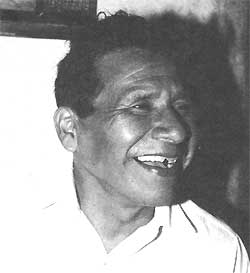 Antonio Díaz
Antonio Díaz
 Antonio Díaz
Antonio Díaz
When Antonio Díaz was a child -- and sometimes even now -- the San Andreseros mixed Catholicism with their traditional indigenous beliefs. Antonio's manner of speaking about those times is extraordinary. In a low voice he speaks profoundly slowly, emphasizing in one way or another the pronunciation of most every word. On about every fifth word he lingers languidly, humming a vowel sound. Also he speaks with something of a lisp. Part of this interesting manner of talking can be attributed to his speaking Spanish with a strong Tzotzil/San Andresero accent, but mostly it's his own idiosyncrasy. When this man speaks of the old ways you sense that the feelings and insights he carries from those days somehow express themselves in the nuances of his strange speech. The following was spoken in Spanish that sometimes reminded me of a lonely owl hooting from deep inside a swamp at night, and sometimes of low thunder rumbling on the horizon, and always they were words being retrieved fromwhat seemed to me an impossibly distant past...
"When I was a child, we did not know about the Word of God. We believed in the images of saints. That's what our grandfathers taught us. Once, for a year, my father took care of the images. They were made of cedar wood. They were painted. St. Andrew with his black beard... About a meter tall. The Virgin was small. Though we worshiped those images in a Catholic church, we didn't know anything about Catholic doctrine. My father thought that the sun was the Father, and that the moon was the Virgin Mary. We called the sun-god Cajuatík. Metík was the moon."
"Once when I was a child I wanted to learn how to pray to the sun-god. So one morning I went with an uncle and his wife and children when they went to pray. It was on the side of a hill. They got down on their knees and faced the rising sun. I got down on my knees with them. But they prayed for a long, long time. About forty minutes. They asked the sun-god to bless their cornfield and their beans. And their animals. And they asked to be forgiven. They kneeled there so long that I almost couldn't stand it."
"For that reason, when one day missionaries came, walking about thirty kilometers up from Tabasco... It was a morning... My father was in the house... Those missionaries were looking for the path to Arroyamita. 'Ayyyyyyy, this is the path,' my father said. 'You're not going to get lost.' But those missionaries asked my father if he could read, and he said that he could read a little. Then my father said, 'Come on in my house.' So they went in and that man, the oldest among them, he took out a Bible. But we didn't know for sure that it was the Bible. Only that it was a big, red book. It was beautiful. And the man began talking about the second coming of Christ. And my father said, 'Really? Really? Really...?' And he was transfixed. He said, 'Sell me that book.' 'I can't sell it,' the old man said. 'But I want to study that book,' my father said. 'I can't sell this one because it's my own,' the old man said. 'But if you wish, the next time we come, we'll bring you one to keep for yourself.'"
"And so when my father had his own Bible, he began studying it. But the Bible was in Spanish and he understood only a little of what he read. He kept finding the name Jehova but he couldn't figure out what that was. 'But what thing is this Jehova?' my father would ask. Then one day the missionaries came again and my father asked them what this Jehova was. 'It's the name of God,' they said. 'Ayyyyyy, and I thought it was the name of a demon,' my father said. And this is the way, little by little, my father learned the Word of God."
"One day a neighbor, a man called Lucas, came to my father. He said, 'I've heard that sometimes strangers come and talk inside your house. Is this good or bad?' 'Ayyyyyy, it's good,' my father said. 'If you want to listen, you come, too. They come every Friday.' Another day, a man called Manuel López came. One time Manual López and my father fought on the trail because Manual López had burned the forest. But now it seemed that Manual López had forgotten about that. 'I also want to know what you are learning,' he said to my father. 'You come, too,' my father said. 'It's the Word of God we hear here, and it's good.' So now there were three men, and that's all it was for almost twelve years. These were the only three men in the village who knew how to read. Then for years my father became a missionary himself. And I did, too.